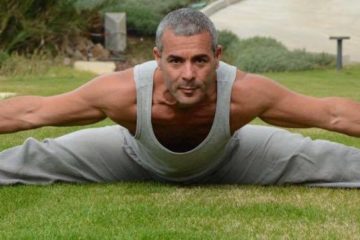
Nutritionist Mihaela Bilic: “We don’t need to eat every day; the only things we need are water and joy”
In order to have a healthy life, it doesn’t matter what and how much you put in the plate, but having answered the question “Why do I eat?” each time you sit at the table – this is how we could resume the message of Mihaela Bilic sent to those concerned about their weight. She is very popular due her media appearances and her bestselling books (among which “Health is Tasty”, “I Live, and therefore I Restrain Myself” and “The ABC of Nutrition”) and she never ceases to improve her knowledge: in 2013 she has graduated a psycho-nutrition master’s course in Paris. Kindly and patiently, she shared to us some essential piecesof advice for a healthy nutrition.
Is there a connection between happiness and body figure?
Unfortunately women – and more recently men as well – measure their self-esteem on the weighing scale. And then, we blame our silhouette for the unhappiness, the lack of fulfillment and the bad things in our lives. We never consider ourselves slim enough or wealthy enough to move on towards another chapter in our lives. We lose the joy of everyday life in this race for the perfect figure.
What is missing in the life of people who are excessively worried of weight?
I am terrified that this concern regards all age and social categories, even 10-12 years old children. The concern for dieting and being slim has become an obsession. I have this theory, and it is almost conspiratorial. I believe that food is intentionally blamed all the time with the purpose of shifting our attention from problems that are more difficult to fix. Maybe the doctors are responsible as well. When the diagnosis is not obvious or stress is the cause, and because there are no medicines available for stress, the doctor doesn’t tell anything clear to the patient and he asks him: “But, how do you eat? Do you eat breakfast?” As a consequence, food is the guilty party…People have this illusion and they believe that, until we get to fix other problems, we can worry about the food in our plate. But, in this quest for healthy food, we get into this vicious circle: we never eat sufficiently healthy, balanced or diversified. I see people spending
more than half of their vital energy on food, which has become some sort of public enemy. Instead of rejoicing in food, and getting pleasure and safety out of it, we end up poisoned in this race for healthy and E-less products.
On the other hand, we do have too many processed foods nowadays, don’t we?
We certainly do, but we cannot control this. This is a necessary evil because the world’s population has grown spectacularly and the traditional agriculture methods are extremely rare.I would be glad if people went all the way in their desire to eat healthily. Meaning they stop going to the supermarket, buy from the local producers, provided that all parties involved in the food chain are honest. In our race for healthy food, we forget that it doesn’t exist anymore.Therefore, it is not worth poisoning our soul saying that everything found in stores is toxic, unhealthy and dangerous, because we will end up being sick. Mistrust and anxiety towards the food in our plate is more dangerous than any foood additives. Due to the pressure of consumers, the food industry is forced to produce cheaper and cheaper food. Everyone looks at the price first, and not just in Romania! If, for example, meat became 10 times more expensive, we would be protected from excess because the farmers would stop producing intensively and we wouldn’t eat too much. We, the consumers, want healthy and cheap food all year round. A French teacher told me that back in the days of his childhood, during wintertime, he would never eat eggs because the hens didn’t lay eggs. What consumer would like to have no eggs during winter in 2017? We cannot turn back the food industry spiral; we cannot go back to the traditional agriculture methods. We cannot remove food excess, our brain doesn’t make the difference between tens of thousands of products on the supermarket shelves.
Then, what solutions can we use to face the abundance of choices?
Full interview https://account.paydemic.com/buy/NQNU4WNUN5CCXDC7HQBHVLYI2E









